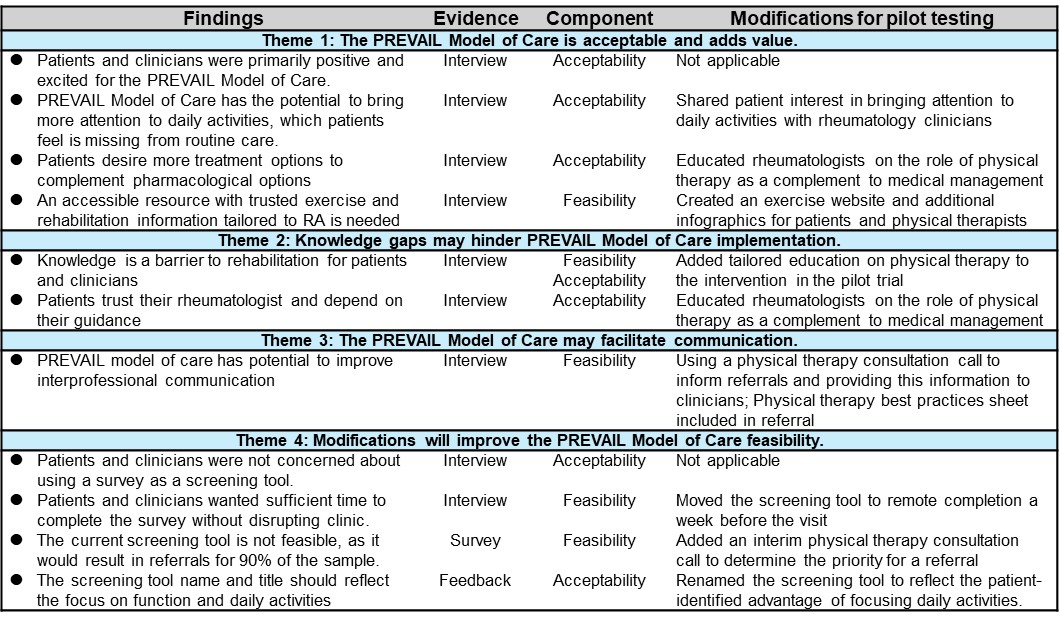Session Information
Session Type: Poster Session C
Session Time: 10:30AM-12:30PM
Background/Purpose: Exercise guidance and referral to physical therapy are not consistently delivered when appropriate in rheumatology care for adults with rheumatoid arthritis (RA). The PREVAIL model of care uses a screening survey assessing disability and functional impairment at a routine rheumatology visit to guide the delivery of exercise guidance and rehabilitation referrals for adults with RA who need it (Figure 1). The purpose of this study was to determine the feasibility and acceptability of the PREVAIL model of care and inform modifications to the model of care for feasibility testing in a pilot clinical trial.
Methods: We used a multi-method approach to learn about the feasibility and accessibility of the PREVAIL model of care from the perspectives of patients, rheumatology clinicians, and physical therapists. We invited adults with RA who received rheumatology care at an academic rheumatology clinic to complete a survey to test the feasibility of the proposed screening tool. We then selected participants across a spectrum of functional limitations to participate in semi-structured interviews via video or phone call. We also interviewed clinicians. A rapid qualitative approach was used to analyze patient and clinician perspectives on feasibility and acceptability. Using the results, we refined the PREVAIL model of care in preparation for a pilot clinical trial.
Results: Of 1508 potential participants, 309 completed the disability screening tool in the survey, which categorized the respondents as no disability (29/309, 9.4%), at risk for disability (30/309, 9.7%), and current disability (250/309, 80.9%). We conducted 30 interviews (24 adults with RA, 5 rheumatologists, 1 nurse practitioner, 6 physical therapists). Patients, rheumatology clinicians, and physical therapists generally perceived the PREVAIL model of care to be a feasible and acceptable approach to systematically integrating exercise guidance and rehabilitation into routine care for RA. Four major themes emerged regarding feasibility and acceptability: (1) The PREVAIL Model of Care is acceptable and adds value; (2) Knowledge gaps regarding the value and role of physical therapy may hinder PREVAIL Model of Care implementation; (3) PREVAIL Model of Care may facilitate communication; and (4) Modifications will improve PREVAIL Model of Care feasibility. Insights from these themes led to modifications to optimize pilot testing for the PREVAIL model of care (Table, Figure 2).
Conclusion: The PREVAIL model of care was perceived as a feasible and acceptable approach to addressing the current barriers to exercise guidance and rehabilitation referral in routine RA care.
 Initial PREVAIL Model of Care proposal prior to the study. Abbreviations: S-VLA, Short Valued Life Activities questionnaire; PT, physical therapy
Initial PREVAIL Model of Care proposal prior to the study. Abbreviations: S-VLA, Short Valued Life Activities questionnaire; PT, physical therapy
.jpg) Themes and major findings supporting feasibility, acceptability, and modifications of the PREVAIL Model of Care
Themes and major findings supporting feasibility, acceptability, and modifications of the PREVAIL Model of Care
.jpg) Refined PREVAIL Model of Care, modified using results of the survey and interview studies. Abbreviations: PT, physical therapy
Refined PREVAIL Model of Care, modified using results of the survey and interview studies. Abbreviations: PT, physical therapy
To cite this abstract in AMA style:
Thoma L, Thompson J, Sharpe J, Jonas B, Katz P, Allen K. Development of the PREVAIL model of care: Optimizing feasibility and acceptability for trial implementation [abstract]. Arthritis Rheumatol. 2025; 77 (suppl 9). https://acrabstracts.org/abstract/development-of-the-prevail-model-of-care-optimizing-feasibility-and-acceptability-for-trial-implementation/. Accessed .« Back to ACR Convergence 2025
ACR Meeting Abstracts - https://acrabstracts.org/abstract/development-of-the-prevail-model-of-care-optimizing-feasibility-and-acceptability-for-trial-implementation/
